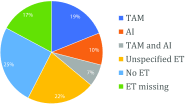Higher ER load is not associated with better outcome in stage 1-3 breast cancer: a descriptive overview of quantitative HR analysis in operable breast cancer
- PMID: 30997625
- PMCID: PMC6548750
- DOI: 10.1007/s10549-019-05233-9
Higher ER load is not associated with better outcome in stage 1-3 breast cancer: a descriptive overview of quantitative HR analysis in operable breast cancer
Abstract
Purpose: In breast cancer, hormone receptor (HR) status is generally a qualitative measure; positive or negative. Quantitatively measured oestrogen and progesterone receptors (ER and PR) are frequently proposed prognostic and predictive markers, some guidelines even provide different treatment options for patients with strong versus weak expression.
Aim: To evaluate quantitative HR load assessed by immunohistochemistry as a prognostic and predictive measure in stage 1-3 breast cancer.
Methods: We reviewed all the available literature on quantitatively measured HRs using immunohistochemistry.
Results: All included studies (n = 19) comprised a cohort of 30,754 patients. Only 2 out of 17 studies found a clear correlation between higher quantitative ER and better disease outcome. Only one trial examined quantitative ER both as prognostic and predictive marker and found no association between ER% and survival. Ten studies examined quantitative PR load, only two of those found a significant correlation between higher PR load and better disease outcome. Two trials examined quantitative PR both as prognostic and predictive marker, neither found any association between PR% and disease outcome.
Conclusions: There is no clear evidence for using quantitatively assessed ER and PR as prognostic nor predictive marker in patients with stage 1-3 breast cancer. We recommend only using a qualitative HR status in future guidelines and treatment considerations.
Keywords: Endocrine therapy; Estrogen receptor; Hormone receptor; Immunohistochemistry; Progesterone receptor; Quantitative assessment.
Conflict of interest statement
The authors declare that they have no conflict of interest.
Figures
Similar articles
-
Poor prognosis of single hormone receptor- positive breast cancer: similar outcome as triple-negative breast cancer.BMC Cancer. 2015 Mar 18;15:138. doi: 10.1186/s12885-015-1121-4. BMC Cancer. 2015. PMID: 25880075 Free PMC article.
-
Prognostic values of negative estrogen or progesterone receptor expression in patients with luminal B HER2-negative breast cancer.World J Surg Oncol. 2016 Sep 13;14(1):244. doi: 10.1186/s12957-016-0999-x. World J Surg Oncol. 2016. PMID: 27619909 Free PMC article.
-
Combined Estrogen Receptor and Progesterone Receptor Level Can Predict Survival Outcome in Human Epidermal Growth Factor Receptor 2-positive Early Breast Cancer.Clin Breast Cancer. 2022 Feb;22(2):e147-e156. doi: 10.1016/j.clbc.2021.05.012. Epub 2021 Jun 16. Clin Breast Cancer. 2022. PMID: 34244052
-
Predictive markers in breast cancer--the present.Histopathology. 2008 Jan;52(1):82-90. doi: 10.1111/j.1365-2559.2007.02897.x. Histopathology. 2008. PMID: 18171419 Review.
-
Oestrogen receptor beta: what it means for patients with breast cancer.Lancet Oncol. 2004 Mar;5(3):174-81. doi: 10.1016/S1470-2045(04)01413-5. Lancet Oncol. 2004. PMID: 15003201 Review.
Cited by
-
Molecular Biomarkers for Contemporary Therapies in Hormone Receptor-Positive Breast Cancer.Genes (Basel). 2021 Feb 17;12(2):285. doi: 10.3390/genes12020285. Genes (Basel). 2021. PMID: 33671468 Free PMC article. Review.
-
Breast cancer hormone receptor levels and benefit from adjuvant tamoxifen in a randomized trial with long-term follow-up.Acta Oncol. 2024 Jul 5;63:535-541. doi: 10.2340/1651-226X.2024.40493. Acta Oncol. 2024. PMID: 38967128 Free PMC article. Clinical Trial.
-
Estrogen Receptor Alpha Mutations, Truncations, Heterodimers, and Therapies.Endocrinology. 2024 Apr 29;165(6):bqae051. doi: 10.1210/endocr/bqae051. Endocrinology. 2024. PMID: 38643482 Free PMC article. Review.
-
The variant T allele of PvuII in ESR1 gene is a prognostic marker in early breast cancer survival.Sci Rep. 2021 Feb 5;11(1):3249. doi: 10.1038/s41598-021-82002-z. Sci Rep. 2021. PMID: 33547330 Free PMC article. Clinical Trial.
-
Prognostic significance of CD8 + tumor-infiltrating lymphocytes in operable breast cancer: a meta-analysis.BMC Cancer. 2025 Apr 2;25(1):601. doi: 10.1186/s12885-025-13912-8. BMC Cancer. 2025. PMID: 40175948 Free PMC article.
References
-
- Allemani C, Matsuda T, Di Carlo V, Harewood R, Matz M, Nikšić M, Bonaventure A, Valkov M, Johnson CJ, Estève J, Ogunbiyi OJ, et al. Global surveillance of trends in cancer survival 2000-14 (CONCORD-3): analysis of individual records for 37,513,025 patients diagnosed with one of 18 cancers from 322 population-based registries in 71 countries. Lancet. 2018;391(10125):1023–1075. - PMC - PubMed
-
- Dekker TJ, Smit VT, Hooijer GK, Van de Vijver MJ, Mesker WE, Tollenaar RA, Nortier JW, Kroep JR. Reliability of core needle biopsy for determining ER and HER2 status in breast cancer. Ann Oncol. 2013;24(4):931–937. - PubMed
-
- Dekker TJA, ter Borg S, Hooijer GKJ, Meijer SL, Wesseling J, Boers JE, Schuuring E, Bart J, van Gorp J, Bult P, Riemersma SA, van Deurzen CHM, Sleddens HFBM, Mesker WE, Kroep JR, Smit VTHBM, van de Vijver MJ. Quality assessment of estrogen receptor and progesterone receptor testing in breast cancer using a tissue microarray-based approach. Breast Cancer Res Treat. 2015;152(2):247–252. - PMC - PubMed
-
- Heuson JC, Longeval E, Mattheiem WH, Deboel MC, Sylvester RJ, Leclercq G. Significance of quantitative assessment of estrogen receptors for endocrine therapy in advanced breast cancer. Cancer. 1977;39(5):1971–1977. - PubMed
-
- McGuire WL. Steroid hormone receptors in breast cancer treatment strategy. Recent Prog Horm Res. 1980;36:135–156. - PubMed
Publication types
MeSH terms
Substances
LinkOut - more resources
Full Text Sources
Medical
Research Materials



